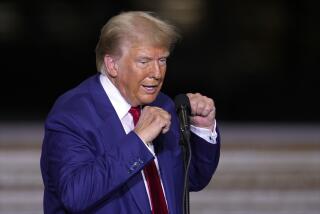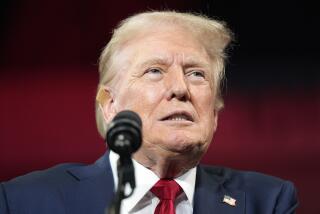Noriega, in Court, Blames U.S. for Freeze on Funds, Pleads for Fairness : Trial: Ex-dictator says government is impeding his defense because he will implicate White House. He complains that wife hasn’t been allowed to visit him.
- Share via
MIAMI — Manuel A. Noriega, standing erect in his full military uniform, made a dramatic plea for fairness Friday, telling a federal court that the U.S. government “has done as much as possible to deprive me of a fair trial.”
The deposed Panamanian dictator, as preparations bogged down for his upcoming drug-trafficking trial, told U.S. District Judge William M. Hoeveler that “the government of the United States does not wish that I defend myself.”
Noriega, uttering his first words in public since being forcibly brought to the United States last January at the conclusion of the U.S. invasion of Panama, protested that he was being prevented from retaining his private lawyers of choice because his overseas bank accounts have been frozen by federal officials.
He added that “psychological warfare” is being waged against him, citing the fact that his wife and daughter have been denied visas to enter the United States to visit him in prison, where he has been kept for the last 11 months.
Speaking forcefully in Spanish with an English interpreter, the former strongman--wearing four general’s stars on his shoulders--pictured himself as an underdog. He told the judge, who listened with rapt attention:
“The battle I am facing is very similar to the invasion my country suffered . . . . And this battle is unfair, also. I find myself at the mercy of a totally unfair system.”
The Justice Department last winter asked European nations where Noriega had deposited his personal funds to freeze 27 identifiable accounts containing $20 million on grounds that the funds were illicit proceeds from drug dealing. But, after complaints by Frank A. Rubino, Noriega’s Miami-based defense counsel, Hoeveler last June ordered the Justice Department to try to unfreeze about $4 million to $6 million so Noriega could pay Rubino and three other lawyers who are defending him.
The lawyers said they had been working without compensation but that Noriega had enough funds so he does not wish to be represented by a public defender or a court-appointed lawyer.
When five months of effort produced no results, however, Hoeveler last week called Justice Department officials into his court for an accounting. They said that foreign countries had been unwilling to free any of Noriega’s funds. The foreign countries expressed doubts that the money was free of the taint of crime and cited their own laws, which give them the right to seize illegal profits. They said they would release funds only if the United States would positively certify that none of the money was drug proceeds, the Justice officials said.
Hoeveler said that, if Noriega’s lawyers would not continue their work, he will have no choice but to name court-appointed lawyers who would be willing to work for about $75 an hour, the legal limit, which is about one-fourth of a private defense attorney’s fee.
On Friday, Hoeveler’s deadline for resolving the matter, Rubino said that Noriega--although he never had spoken in court--wished to address Hoeveler. The judge granted permission.
In a commanding voice, Noriega said that the inability of U.S. officials to unfreeze his bank accounts is “a sham.”
“I know that, when the government of the United States wishes something to be done, they obtain it,” he said. “When they want something from a foreign government, they obtain it.”
Noriega said that, when he ruled Panama, at the request of the United States, “I would allow and order the arrest of persons and authorize the search of vessels with the Panamanian flag in international waters. The DEA knows that and the White House and the Department of State know that.”
He said that U.S. officials had also asked him to violate Panamanian bank secrecy laws in order to provide them with information about drug dealers.
He charged that his defense efforts are being impeded not only by a shortage of funds but by improper government taping of his jailhouse phone calls to his lawyers, because “this case implicates the highest levels of the U.S. government, including the White House.”
Associates of Noriega long have contended that his defense will center on allegations that U.S. intelligence officials condoned or approved of his links with Colombia’s notorious Medellin drug cartel in return for his information about their activities and related events. They have pointed out that President Bush headed the CIA in the 1970s.
“When I was brought to the United States by the Army of the United States in a U.S. Army airplane, I mistakenly believed that I was going to receive a fair trial,” Noriega continued.
He said that he did not blame Hoeveler personally because “you have done the best on my behalf you have been able to do.”
But, he declared, “This is not justice . . . . I clamor to God. He’s the only one who can find a solution.”
Hoeveler, visibly moved by Noriega’s remarks, remained silent for several minutes before assuring Noriega that he would have other “top-flight” defense attorneys to serve him at government expense if a way cannot be found to pay higher fees to his present defense team. Hoeveler said that “a whole series” of qualified defense attorneys recently has contacted him about the case, but he did not give their names.
Rubino and David Lewis, another of Noriega’s present attorneys, suggested that Hoeveler could find that Noriega’s constitutional rights require the government to pay their regular fees of $300 an hour or more. Otherwise, they said, they could not remain on the case.
Hoeveler said he would study the matter for a few days but that he is inclined to reject the Rubino and Lewis pay request.
More to Read
Sign up for Essential California
The most important California stories and recommendations in your inbox every morning.
You may occasionally receive promotional content from the Los Angeles Times.













